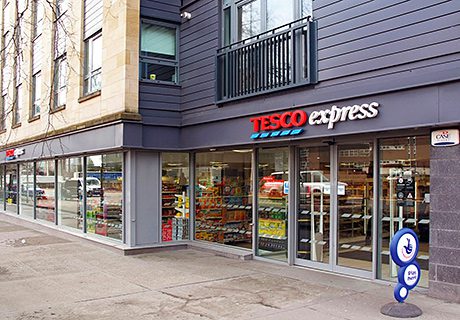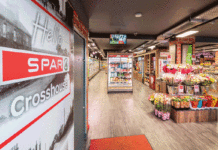
COSTCUTTER CEO Darcy Willson-Rymer is at the heart of a major change in the UK symbol store industry that could have far-reaching effects beyond his own company and its partner retailers.
Costcutter announced its plans to end its supply arrangements with Nisa, tie in with wholesaler Palmer and Harvey, take Mace stores into the Costcutter Supermarkets Group system and form a major new purchasing group, the Buyco. The execution was held up while competition authorities considered aspects of the changes but the plan is now going ahead and is said to be well on track.
Willson-Rymer, experienced in other retail fields including greeting card stores and coffee shops, has now been in the Costcutter job for a year but he told the SGF conference he wanted to talk about the industry as a whole.
Retailing had changed very considerably in the last 25 years, he said.
Growth in the UK population, economic growth and increases in disposable income had led to a significant extension of choice driven by competition and by cultural trends.
More recently there had been the emergence of new channels, especially online.
“Legislation has delivered us out-of-town sheds, mega-malls and, of course, disproportionate rateable values on the High Street,” he said.
“One of the clear winners has been the supermarket majors at the expense of independent retailers. Not just in our sector but in all segments of retail.
“So why are the major supermarkets switching ever more resources into convenience?
“In order for the supermarkets to protect their volume-based growth model they have to expand.
“The one thing that the people in the supermarkets say that I disagree with is that they’re responding to consumer demand. What’s actually happening is that they are creating the consumer demand and, in fact, accelerating it.
‘The independent retailer today is spending anything between four grand a year and 20 grand a year just to bank cash.’
“By opening so much more space they’re clearly giving the consumer more choice of little-and-often, top-up shopping.”
The new c-store sized units did mean independent retailers faced formidable new competition, he acknowledged.
“The convenience stores from the supermarkets are very appealing, they’re relevant to most consumers, they’re bright stores that are well laid out.
“But above all it’s about the brands. People know what they’re going to get and they’re happy to go and shop there.”
However, the effects of the supermarket c-stores on other convenience outlets wasn’t all bad, he argued.
“The thing the supermarkets have done which we should be thankful for is that they’re forcing us to up standards. We’ve seen a rise in standards of convenience retailing, better-looking stores, better investment.
“As independent retailers we have to compete, we have no choice, it’s compete or close, I think.”
But that would take the efforts of all parts of the convenience retail industry, he argued. And Costcutter has a particular point of view.
“We have a firm belief that convenience retail must be dominated by independents. But in order for that to happen, change has got to come.
“We have more than 600 retailers that would love to open a second store. That could be 600 new convenience stores in local neighbourhoods, employing local people
“But if we are going to have independent retailers be more successful then we’re going to have to help the retailers with access to more cash, whether that’s through better margins or access to cash through banks.”
‘As independent retailers we have to compete, we have no choice, it’s compete or close.’
But there are obvious constraints, he said.
“Our suppliers can’t manufacture products for much less. And the consumer’s not willing to pay any more on this side.
“So what we have to do is look at the end-to-end value chain and eke out the waste.
“Many of us have three-quarter full warehouses and three-quarter full trucks driving past other competitors and their three-quarter full trucks.
“If we were brave enough to come together to collaborate to eke out that waste and pass it back to the independent retailer it would be tremendous.”
And as another example he gave everyday banking.
“One of the things that retailers talk to us about all the time is how much it costs to bank cash.
“The range is between 16p and 45p per £100.
“The independent retailer today is spending anything between four grand a year and 20 grand a year just to bank cash.
“It cannot cost the bank 20 grand to count the money but yet we aren’t doing anything about that.
“So it’s about looking at the total value chain not just the supply chain but the total cost that a retailer has, there is money in the system that we have to help them get out, in order for them to get better margin to compete.

“With our suppliers the key conversation is about resource,” he said.
“Many of the suppliers have over-invested in the multiples.
“Just to be blunt about it there are many people who have taken more profit out of the independent sector than was due.”
But he acknowledged that suppliers often argued that promotional and merchandising disciplines were weak in independent retailing and said retailers and symbol operations would have to work with brand owners on the issue.
“We have to come together and say what are the tools, what’s the investment in category management, how do we do micro space management and all of that?”
Symbol groups will also have to work more closely and effectively with their members, he suggested.
“We have to give much more support to our retailers. We have to eliminate all the unnecessary things retailers do, so that they are spending more time customer facing.
“We just helped refurbish a store and we completely redid the range. “The net effect was they took 1400 lines out of the store.
“Between the refurb, the great service that the retailer offers, and having the right range, sales doubled. I appreciate that is an extreme example but where we go in and re-range we’ll end up taking out 800 and 1200 SKUs and sales and profitability usually go up by 20%.”
His message to store owners and operators was to take advantage of advice and help to boost store standards and customer service.
“To all retailers, we’ve got to have the right range in the right place all of the time and we’ve got to help you do that through proper investments in category management.
“The second thing is very basic, the fabric of the store, is it clean, is all the maintenance done, no dings, no fridges out of order and is it easy to shop?
‘We have to eliminate all the unnecessary things retailers do, so that they are spending more time customer facing.’
“The third thing is the customer experience. When the customer leaves is their day better as a result of visiting your store? If the answer is no we haven’t done our job correctly.”
A year into the job he remembered that on his first day he had received a call from a CEO at another symbol group who had welcomed him to convenience retailing and had told him it was the place to be.
He told the conference he felt that was true and he was glad he had joined.
“Personally I hope to make a difference. But collectively I think we will make a difference. And collectively I think we need to support the independent retailer.”














